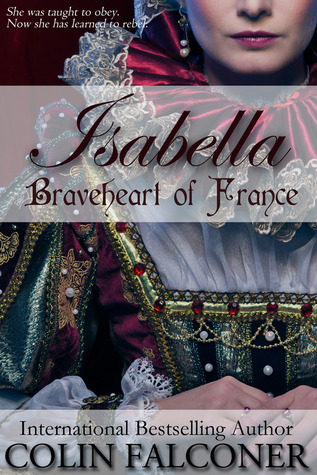 This story is infuriating. Imagine being married to a man who not only takes a lover under your nose, but also flaunts it in front of the entire court? Imagine being a queen only to watch another advise your husband and king, gather all the riches, lands, and titles for himself while spreading lies about you. Imagine watching your husband think with the wrong head not once, but twice, each time causing civil war in the nation. And yet you stand there and constantly try to placate the nobles, write letters asking for aide for your wayward, thoughtless husband, deny your own happiness...
This story is infuriating. Imagine being married to a man who not only takes a lover under your nose, but also flaunts it in front of the entire court? Imagine being a queen only to watch another advise your husband and king, gather all the riches, lands, and titles for himself while spreading lies about you. Imagine watching your husband think with the wrong head not once, but twice, each time causing civil war in the nation. And yet you stand there and constantly try to placate the nobles, write letters asking for aide for your wayward, thoughtless husband, deny your own happiness...This is my second novel about Isabella, the French princess turned English queen of the homosexual Edward. In the first one, I read, The She-Wolf by Pamela Bennetts, she was portrayed as a bitch, a woman who used her own son to attain her own goals.
I became quite engrossed in this version of Isabella and her tumultuous marriage. I could relate to her a lot better than I could Bennetts' version. I could feel empathy and frustration for her; wanted to pull my hair out at times. I like that for once, this queen is portrayed in a manner that doesn't scream "manipulative, evil beeyotch". Instead, the author has showed us how she was treated, how she tried to be a good wife and queen, how out-of-her-control it all was. When she finally takes revenge, it's a long time coming. I mean, seriously, just how much can one woman take? Frankly, I thought it took her too long.
This novel made me see not a she-wolf, but a woman trying to take back what should have been rightfully hers all along. As the front cover says, she was taught to obey, but it's time to rebel. After all she'd been through, I was thrilled when she finally stands for herself.
Something I prefer about this story over She-Wolf is that it takes us through the Gaveston drama, not just Despenser.
I do have some quibbles and most are editorial. I became confused at times about who was good and who was bad. Take "Burstbelly" for example. Was he with them or against them? It seemed to change every time he was mentioned and I don't think the man was switching sides.
"Burstbelly died two nights ago, in Halborn....He was the last one who stood for me against the barons."
And just a few pages before it had said, "Edward summons a Parliament but Lancaster and Burstbelly--she smiles at Gaveston's description--and the other magnates refuse to attend because Gaveston is there.
So...I became a tad confused. But maybe it's just me.
I also grew tired of Isabella reminding us at the end of what seemed every other chapter that she was going to make Edward love and adore her one day, that one day she will have his heart, yada yada. That and the "I'm the daughter of the king of France" became repetitive.
The late-blooming romance with Mortimoor is weird. It's like a love/hate thing and I didn't get it.
There are some editing errors, some minor typos, some doors that open despite the fact they are locked, etc, and I noticed the errors increased in the last half of the story. At that point, even the dead come alive again--Pembroke appears speaking twice after his death and her father is mentioned as well as though he still alive. The present-tense narrative is a bit jarring at first and at times it suddenly becomes first person and my version didn't have italics, making me do a double-take sometimes. Also, I hate this new trend of not putting commas before a person's name when the speaker is addressing him. I get it's a new way, but I hate it. Loathe it. In my day, when you spoke to someone, it was, "It's not what you think, Isabella," not "It's not what you think Isabella."
I don't care if everyone is doing it now; I still hate it.
But I read this quickly. It was interesting, not too heavy on historical details. One of my quibbles with She-Wolf was that at times it began to read like a biography. Falconer doesn't go overboard with that stuff. He also doesn't waste pages and pages describing a room or a dress.
"I shall not submit like a pretty little lamb and let them make the rest of my life sewing and walking in the garden. I am a queen. I want my place at the council and at the king's side and if he will not give it to me I will force his hand. He will see that I am no coward. If he will call for rain then I will give him a tempest."
I received this in digital format from the author in exchange for an honest review.


No comments:
Post a Comment